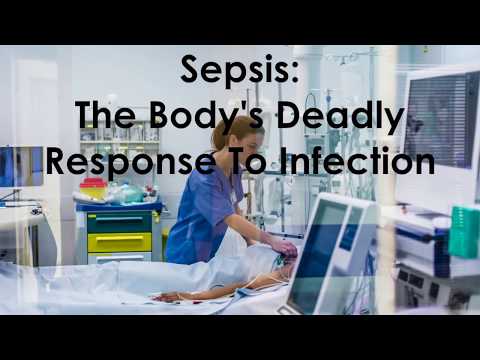Sepsis is a devastating condition that wreaks havoc on the body in alarming ways. It is a life-threatening response to infection that can quickly spiral out of control, leading to organ failure and even death. The immune system, which is designed to protect the body from harmful invaders, goes into overdrive in an attempt to fight off the infection. However, this hyperactive response can result in widespread inflammation throughout the body, causing damage to vital organs such as the heart, lungs, kidneys, and liver. As sepsis progresses, it impairs the body’s ability to deliver oxygen and nutrients to tissues, leading to cellular dysfunction and ultimately organ failure. The circulatory system becomes overwhelmed, causing a drop in blood pressure and inadequate blood flow to the extremities. This can result in tissue damage and even the loss of limbs in severe cases. Sepsis is a silent killer, as its symptoms can be easily mistaken for other less severe conditions. It requires immediate medical attention to prevent further deterioration. Understanding the profound impact sepsis has on the body can serve as a stark reminder of the importance of early diagnosis and prompt treatment, as well as the ongoing need for research and awareness surrounding this deadly condition.

Effects of Sepsis on the Body
| Body System | Effects of Sepsis |
|---|---|
| Cardiovascular System | Sepsis can lead to significant cardiovascular dysfunction, causing low blood pressure, reduced blood flow to vital organs, and impaired oxygen delivery. This can result in organ failure and tissue damage. |
| Respiratory System | Sepsis-induced acute respiratory distress syndrome (ARDS) can occur, leading to severe breathing difficulties. This can result in insufficient oxygen supply to the body’s tissues and organs, potentially leading to multi-organ failure. |
| Gastrointestinal System | Sepsis can disrupt the normal functioning of the gastrointestinal tract, leading to symptoms such as abdominal pain, nausea, vomiting, and diarrhea. This can further exacerbate the body’s inflammatory response and contribute to the progression of septic shock. |
| Renal System | Sepsis-associated acute kidney injury is a common complication, characterized by a sudden decline in kidney function. This can result in fluid and electrolyte imbalances, accumulation of waste products, and ultimately, kidney failure. |
| Central Nervous System | Sepsis can cause neuroinflammation and lead to cognitive impairment, confusion, delirium, and in severe cases, coma. The inflammatory response in the brain can also contribute to long-term cognitive deficits even after recovery from sepsis. |
| Immune System | Sepsis triggers a dysregulated immune response, leading to systemic inflammation. This can result in a cytokine storm, where excessive release of pro-inflammatory molecules can damage tissues and organs, further exacerbating the severity of sepsis. |
“Sepsis Unleashed: Unmasking the Body’s Lethal Reaction to Infection”
Sepsis: Understanding the Devastating Impact on the Body
Sepsis is a life-threatening condition that arises when the body’s response to an infection spirals out of control. It can cause widespread inflammation, organ failure, and even death. To fully grasp the gravity of sepsis, it is essential to understand what it does to the body.
1. Invasion of the Bloodstream
Sepsis occurs when an infection, such as pneumonia or a urinary tract infection, spreads to the bloodstream. Once the infectious agents, such as bacteria or fungi, enter the bloodstream, they can quickly multiply and trigger an overwhelming immune response.
In response to the invasion, the immune system releases chemicals to combat the infection. These chemicals can inadvertently cause widespread inflammation throughout the body, leading to a cascade of detrimental effects.
2. Disruption of Normal Cellular Function
Sepsis disrupts the normal cellular function by interfering with the body’s ability to transport oxygen and vital nutrients. The inflammation caused by sepsis can lead to the formation of blood clots, impairing blood flow to organs and tissues.
Additionally, sepsis can compromise the integrity of blood vessels, causing them to leak fluid into surrounding tissues. This fluid build-up can further impair the delivery of oxygen and nutrients to organs, exacerbating the damage caused by the infection.
3. Organ Dysfunction and Failure
As sepsis progresses, the widespread inflammation and compromised blood flow can lead to organ dysfunction and failure. The organs most commonly affected include the lungs, kidneys, liver, and heart.
In the lungs, sepsis can cause acute respiratory distress syndrome (ARDS), which severely impairs the ability to breathe. Kidney damage can result in acute kidney injury, leading to a buildup of waste products and fluid imbalances. Liver dysfunction can cause jaundice and impair the detoxification process, while septic shock can severely compromise cardiac function.
4. Development of Septic Shock
Sepsis can progress to septic shock, an extremely severe condition with a high mortality rate. Septic shock occurs when sepsis causes a significant drop in blood pressure, leading to inadequate blood flow to vital organs.
The low blood pressure in septic shock deprives organs of the oxygen and nutrients they need to function properly, causing widespread organ damage. Without prompt and aggressive treatment, septic shock can quickly lead to multiple organ failure and death.
5. Long-term Effects and Recovery
Even if a patient survives sepsis, they may experience long-term effects and complications. The damage caused by sepsis can have lasting effects on organ function and overall health.
Survivors of sepsis may experience physical, cognitive, and psychological impairments. Physical impairments can include muscle weakness, fatigue, and difficulty performing daily activities. Cognitive impairments may manifest as memory problems, difficulty concentrating, and confusion. Additionally, many sepsis survivors may develop anxiety, depression, or post-traumatic stress disorder (PTSD) as a result of their traumatic experience.
Conclusion
Sepsis is a devastating condition that can have catastrophic consequences on the body. It invades the bloodstream, disrupts normal cellular function, and leads to organ dysfunction and failure. If left untreated, sepsis can progress to septic shock, which has a high mortality rate. Even survivors of sepsis may experience long-term effects and recovery challenges.
Recognizing the signs and symptoms of sepsis and seeking immediate medical attention is crucial for improving outcomes. With early intervention and appropriate treatment, the chances of survival and recovery from sepsis can significantly improve.

